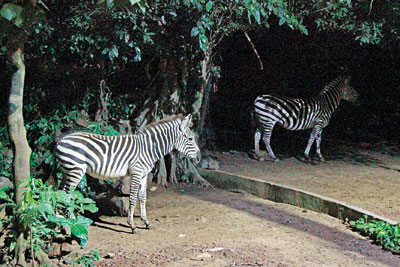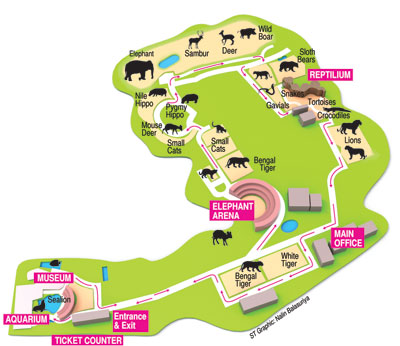News
Orphaned elephants may follow Dehiwela animals in night visits experiment
Pinnawela elephant herds are likely to have visitors at night.

The Zoological Gardens of Dehiwela opened for night visits last week. Pix by Indika Handuwala
The Department of the Zoological Gardens plans to take the night zoo idea to the Pinnawela Elephant Orphanage, a senior Zoological Department official said.
It will depend on the success at the National Zoological Gardens of Dehiwela which opened for night visits last week, the acting director general of the zoo, Dammika Malsingha, told the Sunday Times.
Ms Malsingha explained that the night visits will be allowed on Friday and at weekends between 7:00pm and 10:00 pm. The idea came from the ministry.
She pointed out that 200 animal species out of 300 are exhibited at night. She said that the aquarium, and reptilium which houses 90 species, are open to the public along with 16 mammals including elephants, spotted deer, sambar deer, hippos ( pygmy and river), lions, Bengal tigers, jaguar, Sri Lankan leopard, rusty spotted cats, fishing cats, wild cats, civets, skunks, and zebras.
Ms Malsingha admitted that minor adjustments will have to be made. A bird cage will be covered up and the mouse deer enclosure is not illuminated.
“We have deployed staff to advise, and to monitor people who disturb the animals and to keep people inside the areas that are open,” she said.
Fun activities such as a “fish spa” where people dip their legs in a pool of water where fish will nibble at dead skin will cost Rs 200 per person. The main restaurant, snack bars, ice cream stands, children’s play area are open.
Ms Malsingha said the idea is to attract foreign visitors and local families. A local will pay Rs 200, while visitors will be charged Rs 2,500, which is the usual day time charge.
In the first three days the zoo generated Rs 67,000 from visitors, she said.
There were mixed reactions to the night zoo idea from the staff of the zoo and a conservationist.
One zoo official said that the night zoo in Singapore closes during the day time to give animals a break. He said zoos that allow night visits have larger spaces for animals and have cover for animals that may feel stressed from the human presence at night.

Ms Malsingha
The Singapore Night Safari is spread over 35 hectares, and costs the equivalent of Rs 5,076 per person for entry. The National Zoological Gardens in Dehiwela is a mere 9.3 hectares (23 acres).
The zoo official said he had witnessed reckless, defiant Sri Lankans teasing animals during the day time. “Extending the opening hours from 7:00 to 10:00 pm for three days can be fatal to some sensitive animals, as well as disrupt their natural behaviour and reproduction,’’ he warned.
But the zoo says that animals can rest after 10:00pm.
An environmentalist fears the commercialisation of the facility at the expense of animal welfare.
Environmentalist of the Biodiversity Conservation and Research Circle, Supun Lahiru Prakash, said preservation of animals outside of their natural habitats and education should be the goals of a zoo, but the National Zoo has failed.
Ms Malsingha said the zoo performs five functions, including conservation and breeding, research, education, animal welfare as well as recreation and exhibition.
She said that all five functions must be balanced to maintain a zoo.
Also, revenue must be generated to provide food, medical assistance, and maintenance of enclosures.
Lawyer and animal rights activist Lalani Perera, said animals are being increasingly abused for financial gain.
“The nation’s value system has degenerated to such a low level, that it seems only money matters. The physical and mental suffering of zoo animals due to caging, chaining, separation from their herds, etc. are well documented by animal behaviourists,’’ she noted.
“At a time when many countries are closing their zoos to prevent animals being incarcerated and to allow them to live in their natural habitats, this country is going in the opposite direction by exposing zoo animals to more stress and less rest by allowing night visits.
“Our recommendations to the authorities including a suggestion that the Dehiwela Zoo be closed to visitors at least once a week and that no night visits be allowed, appears to have been shelved due to political and bureaucratic apathy.’’


